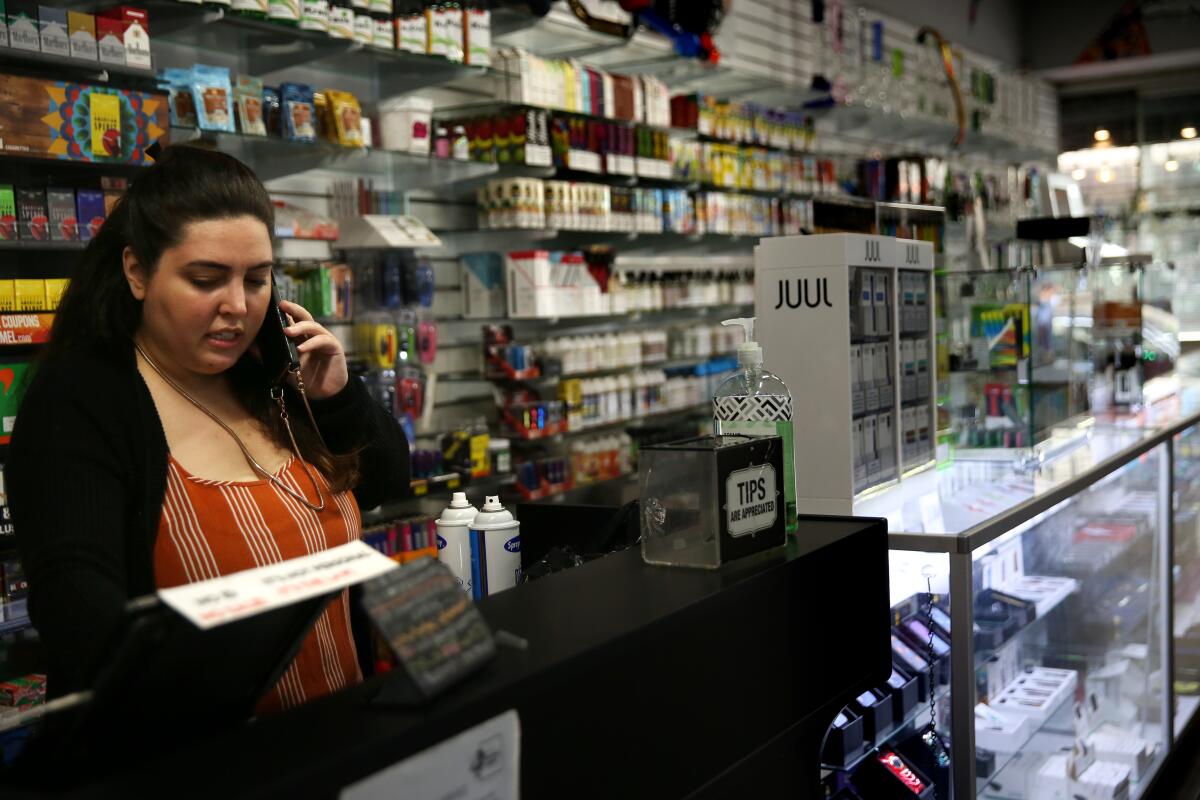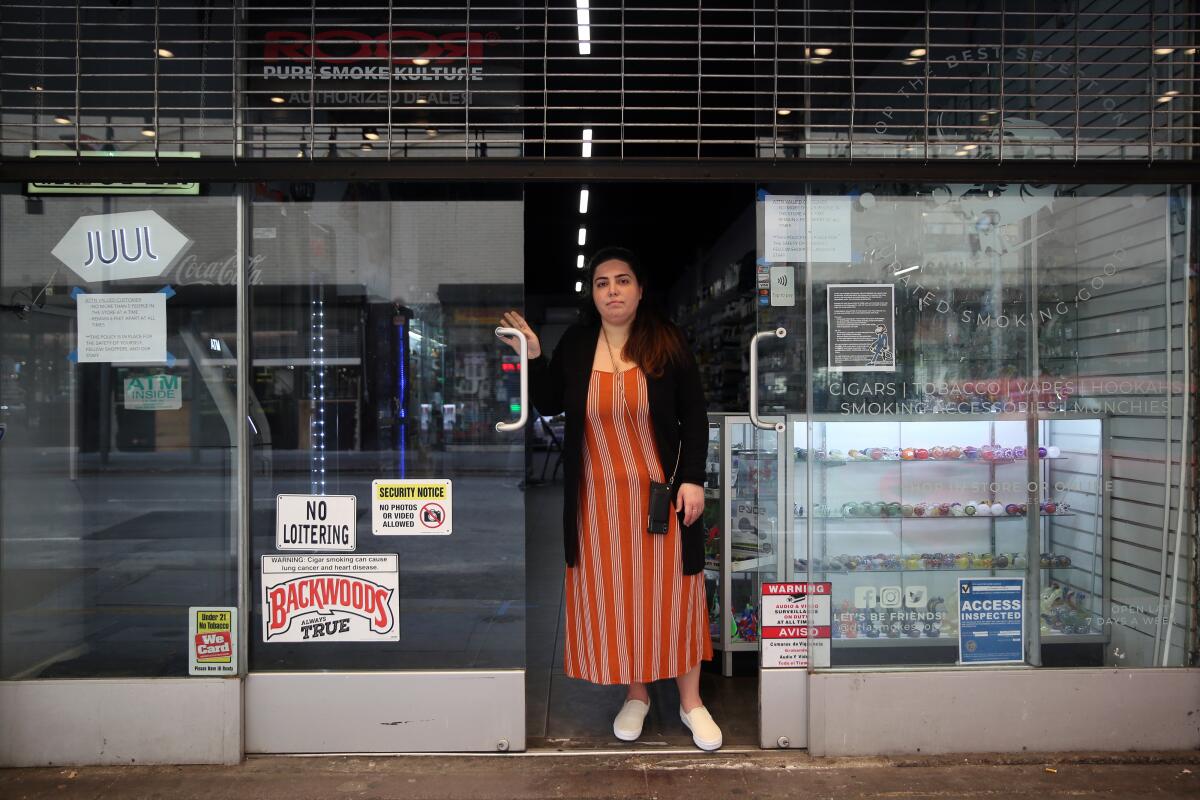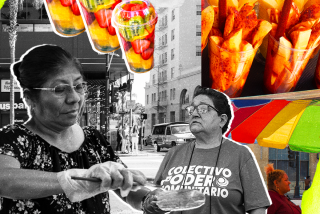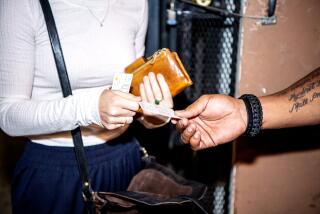L.A. businesswoman fighting back after police accuse her of breaking stay-at-home rules

- Share via
In the eyes of the city of Los Angeles, Natali Mishali is a coronavirus scofflaw.
After California Gov. Gavin Newsom and L.A. Mayor Eric Garcetti ordered all non-essential businesses to shut down in mid-March, her DTLA Smoke Shop remained open. On April 3, Mishali, 30, became one of the first four people criminally charged with violating orders meant to slow the spread of the virus. The other businesses included another smoke shop, a shoe store and a discount electronics retailer.
“Non-essential businesses remaining open at this time jeopardize public health and safety, and my office is committed to vigorously enforcing the mayor’s order,” Los Angeles City Atty. Mike Feuer said in a statement.
With that, Mishali became just one part of a growing culture war over the question of when the U.S. economy should be reopened.
There is increasing pressure to end the closure of businesses as people suffer under the strain of millions of lost jobs and lost revenue. Over the hot weekend, some beaches in Orange County were opened, and Ventura County allowed access to parks and beaches as long as social distancing was maintained. The sight of large numbers of people at Southern California beaches provoked angry debates on social media and even a rebuke from Gov. Gavin Newsom.
Meanwhile, experts say they fear opening too soon could lead to an even worse surge of COVID-19 infections and deaths. As of Tuesday afternoon, nearly 1,800 people have died in California and more than 57,000 have died in the U.S.
But Mishali maintains that she never should have been part of the debate. Her business should have been allowed to remain open, she argues, because it’s not just a smoke shop. Despite its name, her store sells groceries, including single rolls of toilet paper that are especially popular with downtown L.A.’s homeless population.
Last Friday, after being closed for three weeks, Mishali reopened her 6th Street shop on the advice of her lawyer.
Mishali said for the nearly two years since its opening, her smoke shop offered not only cigars, cigarettes and vaping items, but also groceries like cereal and Pop Tarts, cookies, candies, chips, sodas, vitamin water, ice cream and soups. She also sells individual roles of paper towels along with dishwashing soap, bleach and floor and all-purpose cleaners.
We are an essential business. Some might not like the tobacco aspect of our business, but if we have the permits and we sell food, we should be allowed to be open.
— DTLA Smoke Shop owner Natali Mishali
Mishali emailed The Times a receipt for her Los Angeles County-issued food market retail permit, first requested in 2018, which expires this June and allows her to sell limited pre-packaged grocery items. Mishali said a copy of this permit is now present at the store’s register for inspection. County officials have verified the validity of the permit.
Mishali believes the city attorney’s office was overzealous in enforcing the mayor’s emergency, which came at a time when vigilance against businesses flouting COVID-19 guidelines was growing.
“If the name of my business was Downtown LA Convenience Store and Smoke Shop,” Mishali says, she thinks she would not have been criminally charged. “But ... we only have smoke shop in our name.”
While most of the shop is dedicated to tobacco products, there is an entire back section with three large cabinets, 10 wall-mounted shelves and three coolers with food and cold drinks. Mishali said LAPD officers found her in compliance of the mayor’s order multiple times until April 3 — the day she was criminally charged and closed down.
“They would come in, either leave the ordinance with me or tell me I had to shut down and I kept showing them that the shop was following the mayor’s order,” Mishali said. “I was told I could continue to operate my business and then they would show up again and drop the same order the next day.”
On April 4, Mishali’s legal representative emailed Celina Porras, the city’s supervising attorney of tobacco enforcement operations, looking for an explanation behind the charges.
Porras responded two days later with a paragraph from the Los Angeles County Department of Public Health’s website that noted “tobacco shops and vape shops do not qualify as ‘essential’ businesses and should not be open to the public.”
During the closure, she requested copies of all her permits — business license, seller’s permit, tobacco retailer’s permit and food market retail permit.

She says she’s prepared should city officials stop by.
“The city insisted on shutting us down, and we spent the last three weeks just working and doing everything we could to get back open,” Mishali said. “We got our confirmations from the county, and we did everything we possibly could to have an answer for anything the city could throw at us.”
Rob Wilcox, a spokesperson for the city attorney’s office, said in an email that while tobacco stores are “not an essential business,” those that sell additional items will be evaluated “on a case-by-case basis, taking into account all of the applicable permit and licenses from the city, county and state.”
Mishali said she was excited about being able to open her shop, but she said she paid a steep price. She’s already spent over $20,000 in legal fees and believes she lost much more than that in revenue from two smoke shops she’s closed over a three-week period. During the closure, she donated merchandise, but she also threw away some.
To date, the city has not dropped criminal charges against Mishali, whose arraignment is scheduled for July 8 at the Clara Shortridge Foltz Criminal Justice Center in downtown L.A. The case is still listed as pending.
Non-essential business can be fined up to $1,000, while business owners face up to six months of imprisonment.
“We are an essential business,” Mishali said. “Some might not like the tobacco aspect of our business, but if we have the permits and we sell food, we should be allowed to be open.”
More to Read
Sign up for Essential California
The most important California stories and recommendations in your inbox every morning.
You may occasionally receive promotional content from the Los Angeles Times.











